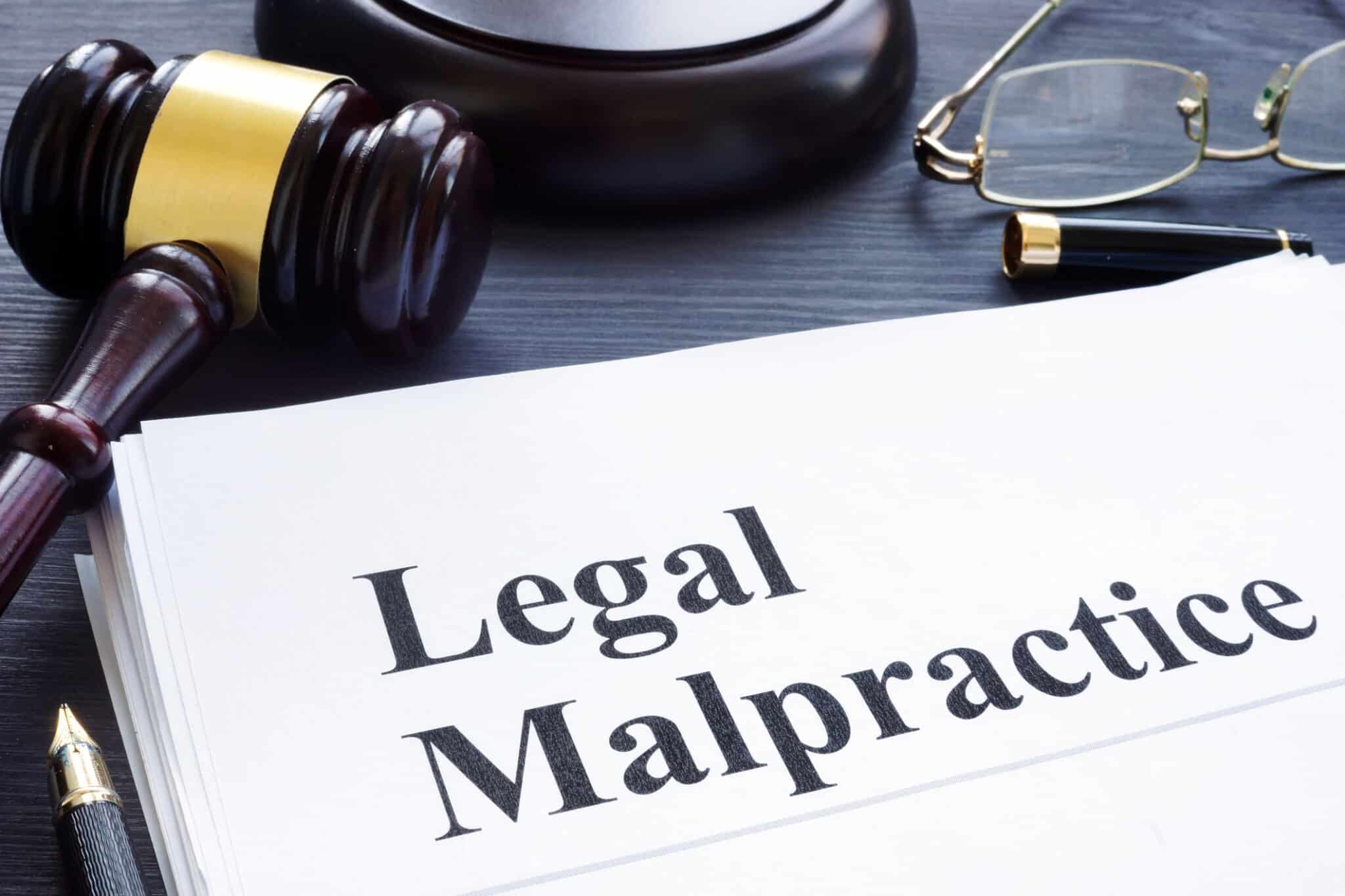What is Legal Malpractice and How Lawyers Can Avoid it

According to the ABA, as many as four in five attorneys will face a legal malpractice suit during their career. Moreover, the majority of malpractice claims are brought against small law firms.
Facing a legal malpractice case can be disastrous for a law firm, both financially and reputationally. In times of change and economic uncertainty, the number of attorney malpractice cases can rise, resulting in higher and more damaging settlements.
However, just because it’s a fairly common problem doesn’t mean attorney legal malpractice should be seen as inevitable. Learning the common factors that lead to malpractice and adopting some common-sense client and case management best-practices can go a long way in avoiding an embarrassing and expensive situation.
What is Legal Malpractice?
A lawyer commits legal malpractice when he or she mishandles a case, causing the client harm or causing damages by his or her professional negligence. The exact definition varies from state to state, but generally speaking, it’s considered malpractice when a lawyer fails to fulfill their professional duties in a way that has a provable effect on the case’s outcome.
To understand what attorney malpractice is, it’s also important to understand what it’s not. It’s not automatically considered malpractice anytime a lawyer makes an honest mistake – many mistakes do not fit the criteria for malpractice at all. On the flip side, malpractice claims are not reserved exclusively for lawyers who are deliberately defrauding their clients or acting maliciously.
What Are the Elements of a Legal Malpractice Case?
Filing an attorney legal malpractice suit is notoriously complicated because there are very specific elements that must be proven, including:
Attorney-Client Relationship
An attorney’s legal advice or help can only be considered harmful to someone if they entered into a formal attorney-client relationship first. Usually, this is demonstrated by showing there is a written contract or agreement between the lawyer and their client, but that is not always the case. If communications or other actions show an attorney is offering their services then it might be deemed that an attorney-client relationship exists without a written retainer agreement.
What exactly qualifies as a formal attorney-client relationship is defined by the ethics rules of the State Bar, which can vary from state to state – so if you’re unsure, it’s best to double check and be overly cautious when offering advice to a prospective client..
Legal Negligence
While an attorney can’t reasonably be expected to be perfect or win every case, they are expected to provide a level of representation that meets basic ethical and professional standards. If an attorney fails to perform their duty at a level on par with their peers, it can be considered negligent. Some examples of negligence include:
- Filing the wrong paperwork
- Missing a deadline or statute of limitations
- Failure to hire appropriate experts
- Breaching confidentiality
- Failure to apply the law appropriately
- Settling a case without the client’s authorization
- Conflicts of interest
- Failing to communicate with a client
It is worth repeating that trying and failing to win a case in good faith is not negligence. But malpractice claims can be based both on a lawyer’s action or inaction. In other words, even things like simply forgetting to file a court document or responding to an email can put your firm at risk.
Financial Damages
It can be difficult to prove that an attorney’s actions directly caused financial harm. In other words, the client must be able to show that if their lawyer acted differently, the outcome of their case would have changed. If the outcome of the case would have been the same regardless of an attorney’s actions, then it is not malpractice.
The financial damages in a lawyer’s malpractice claim can also include fraud or accounting errors, including:
- Commingling funds from trust and operating accounts
- Abuse of a client’s trust account or misuse of funds
- Incorrectly billing hours or fraudulently billing hours
What Happens if a Lawyer is Found Guilty of Malpractice?
If legal malpractice is successfully proven in court, the ultimate goal for the client is to reclaim the losses they sustained.
- Civil Malpractice: If a lawyer’s negligence wasn’t intentional, then it would fall under civil malpractice which typically result in fines and sometimes sanctions. The punishment in civil cases is mostly there to recoup the client’s financial losses. In many instances, attorneys may choose to settle the case out of court to avoid a costly trial and admission of guilt.
- Criminal Malpractice: If an attorney is caught defrauding a client or their negligence is due to intentional actions or malicious intent then the malpractice is considered criminal. Unlike civil malpractice, criminal malpractice carries stiff penalties that can include fines, disbarment, and even jail time.
How to Avoid Attorney Malpractice

The truth is, most attorneys do not intentionally or maliciously make mistakes that cause harm to clients. Often, a law firm’s lack of modern client and case management systems is ultimately what leads to honest mistakes that snowball into professional negligence. Implementing a calendaring system and using tools specifically built to follow legal best-practices can go a long way to avoiding the most common malpractice scenarios.
Here are a few basic tips to protect your firm from legal malpractice risk:
Choose Your Cases Carefully
Getting to know your potential clients before the case starts is the best way to avoid problems down the line. Set up a convenient, but thorough, client intake process to spot potential conflicts of interest or red flags.
While it’s tempting to always take a case and increase revenue, being more selective is the better and less risky option in the long term. At the end of the day, when you enter into an attorney-client relationship, you’re also entering into a business relationship – so approach potential clients with the same detail-oriented, professional mindset.
Also, don’t be afraid to refer clients to another attorney if the case isn’t a good fit for your skillset. Straying too far from your typical practice areas and comfort zone is a recipe for causing misunderstandings or mistakes that can turn into a malpractice claim. While referring clients elsewhere might feel like you’re giving business away, a healthy relationship with other attorneys can lead to more clients coming your way later.
Don’t Rely on Verbal Communication
For clients, getting legal help can be one of the more stressful times in their life and part of a successful lawyer’s job is to have excellent client communication skills. While phone calls and face-to-face conversations can be invaluable, always follow up any verbal communications with an email or written message that:
- Summarizes the conversation
- Confirms any instructions or to-do items
- Sets expectations for future milestones
This not only protects you from accusations of negligence later on, but is a chance for you to clear up any misunderstandings before they become a problem.
It can also be a good idea to set clear expectations regarding communication during the intake process, including:
- What your availability is
- How long it takes to respond to communications
- Who will be responding to their questions
- Where they should ask questions (email, client portal, etc)
Utilizing a legal case management software like MyCase is invaluable for effective client communication as it gives clients and attorneys a secure and convenient way to stay in touch. Additionally, keeping client communications in a client portal instead of email ensures all the relevant details of a case are easy to access and in one place.
Use Legal Calendaring Software
Even the best attorneys make mistakes, but if that mistake is missing a deadline or an important meeting it might become something worse down the line. Instead of relying on paper calendars to juggle multiple cases, leading law firms are increasingly turning to legal calendaring software to get full team and client coverage.
Modern case management solutions can centralize all appointments, meetings, and events into one central calendar to make sure nothing slips through the cracks. Additionally, attorneys can have even more peace of mind by setting up automated or pre-scheduled reminders and updates.
Keep Detailed Records
When a case doesn’t turn out as expected, especially during hard economic times, a client’s first instinct might be to blame their attorney. If you do not have the documentation to defend yourself against a claim of negligence, then you are putting your law firm at risk. With manual time tracking and data entry, crucial details tend to get lost or are harder to refer back to later.
Legal case management software like MyCase comes with built-in time tracking and document management capabilities to help reduce your malpractice risk. Modern solutions can even automatically track time spent on calls and emails for every case, creating an easy-to-follow paper trail. Better time tracking also ensures you don’t accidentally mix up billable and non-billable hours or run into other preventable ethical issues.
In addition to time tracking, it’s important to digitize your legal records storage for future reference. Digital documents are more secure and easier to organize, allowing you to simplify how you maintain legal document compliance.
Consider Malpractice Insurance
Some states require legal professionals to carry malpractice insurance, but even when it’s not legally required it might be a good idea to consider getting it anyway. Further, some practice areas are more prone to malpractice claims than others, like real estate or commercial law.
While you may have no history of malpractice claims against you, that doesn’t mean it’s impossible – and even if a claim is bogus, malpractice cases can be complicated and a major drain on your firm’s resources. Malpractice insurers often retain attorneys that specialize in malpractice cases, allowing you to get expert advice when trouble does arise.
It’s important to weigh whether or not the costs of the insurance premiums are worth it for your business. However, if you decide to get it, make sure you do your research to know exactly what your policy will cover.
Leverage Legal Technology to Reduce Risk
These days, more people are doing important tasks online, including getting legal help. But while digital spaces are more convenient, they also create more opportunities for even honest mistakes and misunderstandings to become potential malpractice claims against your firm.
Leading law firms rely on MyCase case management software to centralize their client communication, calendaring, billing, and more. By leveraging a modern solution, you can easily implement systems that are not only more convenient to use but reduce the risk of missing deadlines and other common mistakes.
Schedule a demo or try MyCase risk-free with a 10-day free trial. We offer affordable monthly and yearly subscriptions. Plus, no commitment or credit card is required, and you can cancel anytime.





